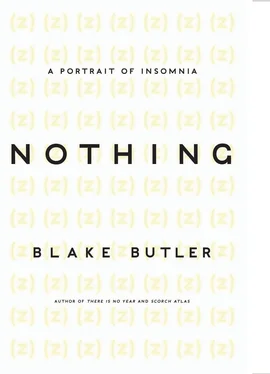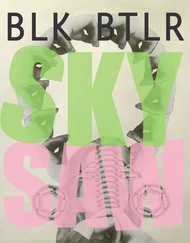I’m no longer sure what I was so afraid of in the nights by the age of these recordings. Fear then seemed a product of itself — as if I was afraid precisely because I did not know what to be afraid of, or of the silence of the air demanding something soon to come. I can remember feeling crippled in the idea of drifting into the nothing of the space between the planets — no sound, no oxygen, no object but in incidental drift and fixed massive centers among the billioned grid of light defined by its absence for unindexed, countless miles — toward what but nothing — nameless. The black of that space lidded over, ever-present awakening, at windows — the sky at all times overhead. And yet, underneath this, I could not turn away from what seemed not even there. I was obsessed with space, the empty. I wanted near it. The plastic ream of neon stickers on the ceiling again replicating that same voidspace between lit spots overhead. I developed an obsession with becoming an astronaut despite, or in the wake of, the fear itself — eating space ice cream, watching and rewatching the movie SpaceCamp , wishing I was there inside the film, and yet never begging really to go to the camp itself — a spectator on the cusp of the machine.
In daylight, such recurring secret presences spread on playgrounds, whispered in the long white concrete halls of public school. Charles R., who ran headlong into the rumor of the Bell Witch, where he claimed to have chanted “Bell Witch, Bell Witch, Bell Witch, I hate you Bell Witch” into his bathroom mirror one night before bed, and then woken up with claw marks on his chest. And in that same grade, Corey C., who claimed his uncle had been decapitated by a flying Ouija board after trying to contact the center of the sun. The presence of our own Ouija board inside my house no doubt added to my internal terror, despite its hidden away station in my mother’s sewing room between a table and the wall. What second flooding throttled through me some nights when I would find her using the surface as a lap desk for her sewing in front of the TV, the presence of Corey’s language replicating in my body, draping, its presence still there even after she would return it to its hold. These objects, verbal yet heavy, strobed into my skin. They woke me up and kept me waking: a fodder for a blue brain, already curling in overthought: as more than any other presence, after sickness, or in great pain, it is the self inside the self that keeps one up. I am a part of Charles R., and Charles is in me, and his witch breath, and his lungs — if he is alive somewhere, or ever — the words he’s written down or felt against his head since the last time we stood in the same room. The hair that’s fallen out of Corey. The light we shared through our TVs. This list remains unending, a short link in a rope that wraps around my head, coiling something out and something in.
With us in the house, behind the locked doors, we had machines: eyes of light and shapes that counted time and boxes covered with buttons one could press, things that stayed awake and in the same mode whether you would sit with it or would not. My family’s first computer was the Apple IIGS model, sold to my parents for its supposed heightened graphics and clear sound, which at the time were something to behold. On this machine I began to worm into devices stored on discs, creations generated from long fields of text and ordered into strange displays, phrases coded into columns that when compiled might run a routine — I particularly liked writing variations on a program that would lock the computer until a password was entered, forcing the user to either know my command or press reset. I also drew up several text-based role-playing adventures that mostly went nowhere — I would give up before I got so far into the world they had a mass, thus leaving shells and shells of spaces scattered in code on discs ending in nothing, the blinking cursor awaiting my next command: ]]]. These languages I arranged had at least two kinds of speaking to them — the language meant to deliver the machine its code, and the words that the user would receive when the program ran, though I was the only one who ever played them — I had no one else to give them to. This duality of speaking — code arranged for some end purpose, arranged in networks of numbered make — would keep me up for hours in conversation both with the machine and with my future self, spooling up in discs that I still keep slid in black jackets in a closet of my parents’ home, waiting for no one, alive, condemned.
Our printer with that same machine — some then-new dot matrix — gave off a rhythmic screeching with its work, as if it hurt to let the ink out, the paper spooling from its long slit mouth page by page. Many times the machines, in their transmission, would skew my sent-out data into glyphs. Somewhere in the wire between where on the screen I had typed my coded language in compulsion, the bytes of text would become disrupted. One page would spit out as eighty, all symbol and syntax, strings of characters in the speech of something else. These ejections would slur and spool out of the racket for hours, or as long as I would let the heads roll on, sixty, eighty pages, more. As with my keys before and IT , I would carry these pages into my room and sit with them for hours, combing the lines for hidden sound — secrets, maps, directions, code words, some human mumbling — or worse, something lost and terrifying to mesmerize me in the manner the horror book had. I sat up cross-legged well into the night scouring page after page with a glass and a highlighter, looking for something I could not name now or then, but still knowing fully it was in there, somewhere, if I could bring myself to find. Circling dots or loops or phrases in the error mass that might lead to incantation, a codelock. I believed in Borges before I’d read him: “There is no combination of characters one can make— dncmrlchtdj , for example — that the divine Library has not foreseen and that in one or more of its secret tongues does not hide a terrible significance.” Into the night, and another night and another night, becoming another long string of the unblinking, of the never cutting out, which therein began to form its own encroaching, muddled string of text and sound and image — the source of day itself in the image of some huge dot matrix printer over all things, spooling out of some enormous mouth somewhere far off and nowhere below the sky. Each night, when I had finished combing through the papers as much as I could manage, the ink transferred in abstract splotches against my hands, I would stack the paper in my closet, hidden from whoever else might think, as if the information had been meant for me and me alone, something designed to creep just at the cusp of me, knitted, waiting to be found, so that at any moment, if I closed my eyes, I might miss the instance of the thing at last that reveals the thing itself — the thing about me and the me in me there that I always wanted and never knew to name. What these words woke in me were different even from the words in books or movies, but something just above my head, a presence fed into the home cloaked in a shape that tempted its revealing, that kept me up nights longer in my wish for what it hid to come all in.
]
]
]
It wasn’t long inside the longing silence of the house at night, alone up too late and hearing everything in nothing — the reading having ended, words remaining only words — that I began at bedtime to lie often with my head out in the hall. I’d set a makeshift bed up on the floor between the doorframe of my bedroom so I could see down along the center of the house, into the living room where my parents stayed up most nights watching TV, my mother often also sewing, my father nodding off there in his chair. I could not even see my parents’ bodies there directly, but could see that light, and hear the sounds, and know someone else was there, the sound of the television and their talking and eventually the movement from the room there to the bed. In this way I would stay awake for further hours, stretching my body, in paused want. The tension of that waiting, seeing, needing made nights longer in their unmonitored procession. I am not sure what I imagined my mother or father would do in the event a menace-presence— mugger, phantom, giant —did come into the house, but the anxiety suspended in that between — the borderlined anticipation of the terror and the presence of that most familiar other — nameless, frameless people coming in from somewhere, made aware in minor sound often blamed on aging houses — shift of beams, settling eaves — which often become carried over inside language, speaking, of a people — air inhaled by others at the same minute as I inhaled mine, or the way their bodies had their own space, their own anatomies, their organs inside.
Читать дальше












